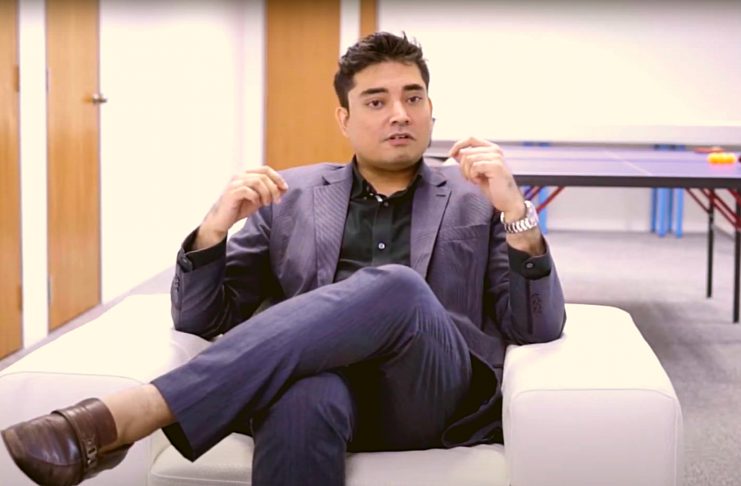Breaking the Mold: Sancy Suraj’s Vision for the Future of Corporate Learning
Sancy Suraj is the CEO of Knowles Training Institute, a leading corporate training company headquartered in Singapore that provides a range of training courses to over 30 countries worldwide. With a passion for unlocking the full potential of individuals and organizations, Sancy has been breaking the mold of traditional corporate training and redefining what it means to learn and develop in the workplace.
As an entrepreneur and leader in the corporate training industry, Sancy has a unique perspective on the challenges and opportunities facing organizations today. In this article, we explore Sancy’s vision for the future of corporate learning, his approach to innovation, his strategies for measuring the success of training programs, and his advice for individuals and organizations looking to improve their corporate learning and development initiatives.
You’ve spoken about “breaking the mold” of traditional corporate training. What does this mean to you, and how is Knowles Training Institute redefining what it means to learn and develop in the workplace?

Breaking the mold of traditional corporate training is all about challenging the status quo and finding innovative ways to deliver learning and development programs in the workplace. At Knowles Training Institute, we believe that traditional training methods are often outdated and ineffective, and that businesses need to embrace new approaches if they want to stay ahead of the curve. This means moving away from one-size-fits-all training programs and instead providing customized solutions that are tailored to the specific needs of each organization.
One way that we are redefining what it means to learn and develop in the workplace is by leveraging technology to create immersive and engaging learning experiences. For example, we use virtual reality simulations to help employees practice real-world scenarios in a safe and controlled environment. This allows them to develop critical skills and knowledge in a way that is both effective and enjoyable. We also use gamification techniques to make learning more interactive and fun, which helps to keep employees motivated and engaged.
Another key aspect of our approach is our focus on ongoing learning and development. We believe that learning is a continuous process that should be integrated into everyday work activities. To support this, we provide our clients with a range of resources and tools that enable employees to continue their learning journey long after the training program has ended. This includes access to online learning platforms, coaching and mentoring programs, and regular feedback and performance assessments.
Overall, our goal is to help businesses create a culture of learning and development that empowers their employees to reach their full potential. By breaking the mold of traditional corporate training and embracing new approaches, we believe that we can help organizations stay ahead of the curve and succeed in an ever-changing business landscape.
What role does innovation play in your approach to corporate learning, and how do you stay ahead of the curve when it comes to new developments and emerging trends in the industry?
Innovation is at the heart of our approach to corporate learning at Knowles Training Institute. We are constantly looking for new and innovative ways to deliver effective training solutions that meet the needs of modern businesses. Our goal is to stay ahead of the curve and provide our clients with the latest and most effective learning tools and techniques available.
To achieve this, we have a dedicated team of experts who are always on the lookout for emerging trends and developments in the industry. We attend conferences, read industry publications, and engage with thought leaders to stay up-to-date on the latest advancements in corporate learning. We also invest heavily in research and development, conducting our own studies and experiments to identify new approaches and techniques that can improve learning outcomes.
One way that we stay ahead of the curve is by embracing technology and using it to enhance the learning experience. For example, we use virtual reality simulations, gamification, and other digital tools to create engaging and immersive learning experiences that are proven to improve retention and engagement. We also use data analytics to track learner progress and identify areas where further support is needed.
Another important aspect of our approach to innovation is our focus on customization. We recognize that every organization is unique, with its own set of challenges and opportunities. That’s why we work closely with our clients to create customized learning solutions that are tailored to their specific needs and objectives. By taking this approach, we are able to deliver more impactful training programs that drive meaningful results.
Overall, innovation plays a central role in our approach to corporate learning. By staying ahead of the curve and embracing new developments and emerging trends in the industry, we are able to provide our clients with the most effective and engaging learning experiences possible.
You’ve mentioned that you’re passionate about helping individuals and organizations to unlock their full potential. How do you measure the success of your training programs, and what impact have they had on your clients’ businesses and careers?
At Knowles Training Institute, we believe that the success of our training programs should be measured by their impact on our clients’ businesses and the careers of their employees. We take a results-oriented approach and strive to deliver training solutions that help our clients achieve their objectives and drive meaningful outcomes.
To measure the success of our training programs, we use a variety of tools and techniques. These include pre- and post-training assessments to track learner progress, regular feedback from participants and stakeholders, and data analytics to measure the impact on key business metrics such as sales, customer satisfaction, and employee engagement. We also conduct follow-up surveys and interviews to track the long-term impact of our training programs on the careers of individual participants.
The impact of our training programs on our clients’ businesses and careers has been significant. For example, we have helped businesses improve customer satisfaction scores, increase sales revenue, and reduce employee turnover rates. Our programs have also helped individual participants to develop new skills and competencies, gain confidence, and progress in their careers. Many of our clients have reported that our training programs have had a positive impact on their overall business performance and contributed to their long-term success.
Ultimately, our goal is to help individuals and organizations unlock their full potential and achieve their goals. We measure the success of our training programs not just in terms of learner satisfaction or completion rates, but in terms of the real-world impact they have on our clients’ businesses and the careers of their employees. By focusing on results and delivering training solutions that drive meaningful outcomes, we are able to help our clients stay ahead of the curve and succeed in an ever-changing business landscape.
“The true measure of success in training programs lies not in the number of certificates issued or participants trained, but in the tangible impact they have on the businesses and careers of those who take them. At Knowles Training Institute, we pride ourselves on our results-oriented approach, using data analytics and feedback to ensure that our programs unlock the full potential of our clients and their employees.”
How do you see the future of corporate learning evolving in the next 5-10 years, and what steps is Knowles Training Institute taking to adapt to these changes?
The future of corporate learning is likely to be shaped by several key trends and developments over the next 5-10 years. These include the increasing use of technology and digital tools, a growing emphasis on personalized learning, and a shift towards more flexible and adaptive learning models.
At Knowles Training Institute, we are actively taking steps to adapt to these changes and position ourselves at the forefront of the evolving corporate learning landscape. One of the key ways we are doing this is by continuing to invest in technology and digital tools that enhance the learning experience. This includes virtual reality simulations, gamification, and other innovative tools that engage learners and improve learning outcomes.
We are also increasingly focused on personalized learning, recognizing that every individual has unique learning needs and preferences. To this end, we are developing more customized and adaptive learning solutions that can be tailored to individual learners and their specific goals and objectives. We are leveraging data analytics and other tools to track learner progress and adapt our programs in real-time to maximize the impact of the training.
Another important aspect of our approach to adapting to the future of corporate learning is our focus on agility and flexibility. We recognize that the business landscape is constantly evolving, and that the learning needs of organizations and individuals are likely to change rapidly in the coming years. That’s why we are committed to developing learning solutions that can adapt quickly to changing needs and circumstances. We are exploring new delivery models such as microlearning, on-demand training, and blended learning that provide more flexibility and can be accessed anytime, anywhere.
Overall, we believe that the future of corporate learning will be defined by innovation, personalization, and agility. By staying ahead of the curve and adapting to these changes, we are confident that Knowles Training Institute will continue to deliver impactful training solutions that help individuals and organizations unlock their full potential and achieve their goals.
You’ve mentioned that you’ve trained over 100,000 professionals across multiple industries. How do you ensure that your training programs remain relevant and effective for such a diverse range of learners?
At Knowles Training Institute, we recognize that one size does not fit all when it comes to corporate training. That’s why we take a learner-centric approach to design our training programs, taking into account the diverse needs, backgrounds, and learning styles of our learners.
To ensure that our training programs remain relevant and effective for a diverse range of learners, we follow a rigorous process of needs analysis, design, development, delivery, and evaluation. We work closely with our clients to understand their unique learning needs and goals, as well as the specific challenges and opportunities in their industry. This allows us to tailor our training programs to meet the specific needs of our learners and deliver maximum impact.
We also invest heavily in research and development to stay ahead of emerging trends and best practices in the industries we serve. This includes engaging with subject matter experts, conducting market research, and analyzing data to identify emerging needs and opportunities for innovation. We continuously update and refine our training programs to ensure that they remain relevant and effective in an ever-changing business landscape.
Another important aspect of ensuring the relevance and effectiveness of our training programs is our commitment to continuous improvement and evaluation. We regularly collect feedback from learners and stakeholders to identify areas for improvement and refine our programs accordingly. We use data analytics and other tools to track learner progress and measure the impact of our training programs on key business metrics. This allows us to continuously refine our training solutions to meet the evolving needs of our clients and learners.
Overall, our approach to ensuring the relevance and effectiveness of our training programs for a diverse range of learners is based on a learner-centric approach, investment in research and development, and a commitment to continuous improvement and evaluation. By remaining agile and responsive to emerging needs and opportunities, we are able to deliver impactful training solutions that help our clients and learners achieve their goals and stay ahead of the curve.
“Effective training is not just about imparting knowledge, it’s about understanding the diverse needs, backgrounds, and learning styles of learners. At Knowles Training Institute, we take a learner-centric approach, invest in research and development, and commit to continuous improvement to ensure that our training programs remain relevant and impactful in an ever-changing business landscape.”
In response to our first question, Sancy shared his views on breaking the mold of traditional corporate training. He emphasized the importance of learner-centric approaches and how Knowles Training Institute is redefining what it means to learn and develop in the workplace by focusing on individualized learning experiences and aligning training programs with the overall business goals of organizations.
Sancy’s commitment to innovation was a key focus of our second question. He discussed how Knowles Training Institute stays ahead of the curve when it comes to new developments and emerging trends in the industry, emphasizing the importance of agility, experimentation, and collaboration with clients and industry partners.
In response to our third question, Sancy shared his strategies for measuring the success of training programs, highlighting the importance of data analytics and evaluation methods to identify areas for improvement and refine training programs to ensure they are aligned with overall business goals. He also spoke about the impact of Knowles Training Institute’s training programs on their clients’ businesses and careers.
Our fourth question focused on the future of corporate learning, and Sancy shared his insights on how he sees the industry evolving over the next 5-10 years. He emphasized the need for agility and adaptation, as well as the importance of digital transformation, personalized learning experiences, and continuous learning and development.
In response to our fifth question, Sancy discussed his strategies for ensuring that Knowles Training Institute’s training programs remain relevant and effective for a diverse range of learners, highlighting the importance of learner analysis, individualized learning experiences, and ongoing evaluation and refinement.
Finally, in response to our sixth question, Sancy offered his advice to individuals and organizations looking to improve their corporate learning and development initiatives. He emphasized the importance of adopting a learner-centric approach, aligning training programs with overall business goals, choosing effective delivery methods, measuring the impact of training initiatives, and prioritizing continuous learning and development.
What advice would you give to individuals or organizations that are looking to improve their corporate learning and development initiatives, and how can they ensure that their efforts are aligned with their overall business goals?

My advice to individuals or organizations looking to improve their corporate learning and development initiatives is to adopt a learner-centric approach and align their efforts with their overall business goals.
To achieve this, it’s important to start by conducting a needs analysis to identify the specific learning needs and goals of your employees, as well as the overall business objectives. This will help you design and deliver training programs that are tailored to meet the specific needs of your learners and align with your overall business goals.
Another important factor to consider is the delivery method of your training programs. In today’s digital age, there are a variety of ways to deliver training, including e-learning, virtual instructor-led training, and blended learning approaches. It’s important to choose a delivery method that is aligned with your learners’ preferences and learning styles, as well as your overall business goals.
In addition to delivering effective training programs, it’s important to measure the impact of your training initiatives on key business metrics. This can be done through data analytics and other evaluation methods, which will help you identify areas for improvement and refine your training programs to ensure they are aligned with your overall business goals.
Finally, it’s important to prioritize continuous learning and development within your organization. This means fostering a culture of learning and development, providing ongoing opportunities for employees to learn and grow, and investing in the development of your employees to ensure they have the skills and knowledge they need to succeed.
In summary, my advice for individuals or organizations looking to improve their corporate learning and development initiatives is to adopt a learner-centric approach, align their efforts with their overall business goals, choose effective delivery methods, measure the impact of their training initiatives, and prioritize continuous learning and development. By doing so, you can create a culture of learning and development that will drive success and growth within your organization.
“Effective corporate learning and development initiatives should not only be aligned with business goals, but also driven by the needs and goals of the learners. By prioritizing a learner-centric approach and continuously evaluating the impact of training programs, organizations can cultivate a culture of growth and development that fuels their success.”
As an entrepreneur and leader in the corporate training industry, Sancy Suraj has a unique perspective on the challenges and opportunities facing organizations today. His vision for the future of corporate learning is one that is learner-centric, agile, and adaptable, with a focus on individualized learning experiences and alignment with overall business goals. With his passion for unlocking the full potential of individuals and organizations, Sancy is breaking the mold of traditional corporate training and redefining what it means to learn and develop in the workplace.














